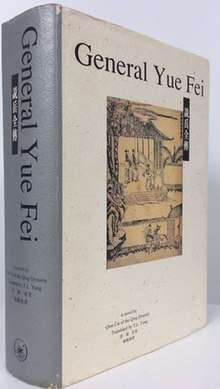General Yue Fei
General Yue Fei (Chinese: 說岳全傳) is a Chinese historical novel written by Qian Cai in the Qing dynasty. The first 61 chapters detail the life and adventures of Yue Fei. The last 19 concern the exploits of Yue Fei's son Yue Lei after Yue Fei's unjust death.
 | |
| Author | Qian Cai |
|---|---|
| Translator | T.L. Yang |
| Country | Qing dynasty |
| Language | Written Chinese |
| Genre | Historical fiction |
| Set in | 12th century |
| Media type | |
Description
The author Qian Cai (錢彩) lived sometime during the reigns of the Kangxi and Yongzheng (1661–1735) emperors of the Qing dynasty.[1] A dating symbol in its preface points either to the year 1684 or to 1744.[2] It was banned during the reign of the Qianlong Emperor. There are two main versions of this novel. The original one had 80 chapters. There was an illustrated edition of this version published in 1912.[3] The other version also had 80 chapters and was published during the reign of the Tongzhi Emperor (1861–1875).
Some people mistakenly take this novel to be historical fact when it is purely fiction.[4] According to Sir Yang Ti-liang's introduction to his translation:
The work is a historical novel in form, but it is in fact based almost mainly on legends which were current amongst the common people for centuries. Indeed some of the events described there are nothing more than Qian Cai's own imagination.[5]
English translation
Starting in 1964 and finishing in 1995, Sir Yang Ti-liang, former Chief Justice of Hong Kong, current Chairman of the Hong Kong Red Cross, combined the first chapters of these works (in an attempt to weed out the overabundance of supernatural elements) to create a 79-chapter version with 961 pages, which he translated into English. It was published by Joint Publishing in 1995.[5]
Major characters

.jpg)
Protagonists
- Yue Fei and his family
- Yue Yun, Yue Fei's first son
- Yue Lei, Yue Fei's second son
- Zhang Xian
- Niu Gao
- Yang Zaixing
- Gao Chong
- Lu Wenlong
- Wang Zuo
- Zhou Tong
- Huyan Zhuo
- Han Shizhong
- Liang Hongyu
Antagonists


References
- van Leeuwen, Richard (2017). "The Knight and the King". Narratives of Kingship in Eurasian Empires, 1300-1800. Brill Publishers. pp. 109–162. JSTOR 10.1163/j.ctt1w8h2gc.9.
- Jochen Degkwitz, Yue Fei und sein Mythos. Die Entwicklung der Yue-Fei-Saga bis zum, Shuo Yue quan zhuan, Chinathemen 13, edited by Helmut Martin, Volker Klapsch and Martin Krott (Bochum: N Brockmeyer, 1983 (ISBN 3-88339-321-5)
- Henning, Stanley E., M.A. Chinese General Yue Fei: Martial Arts Facts, Tales and Mysteries. Journal of Asian Martial Arts. Vol. 15 #4, 2006: 30–35
- The Creation of Xingyi Archived September 28, 2007, at the Wayback Machine – Though it is presented as historical fact, the Yue Fei biography from this page is derived solely from the fictional elements of this wuxia novel.
- Qian, Cai. General Yue Fei. Trans. Honorable Sir T.L. Yang. Joint Publishing (H.K.) Co., Ltd. (1995) ISBN 978-962-04-1279-0